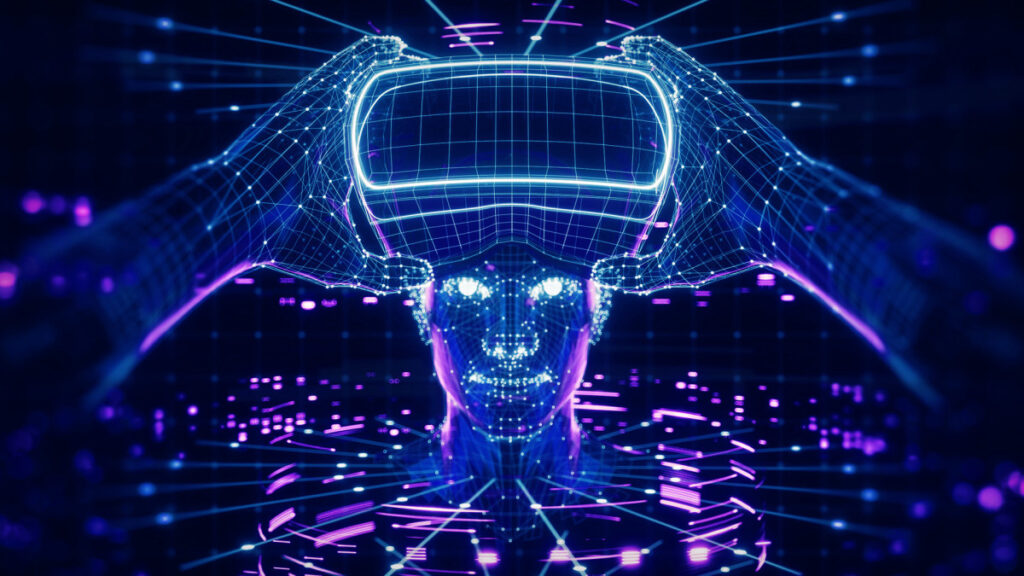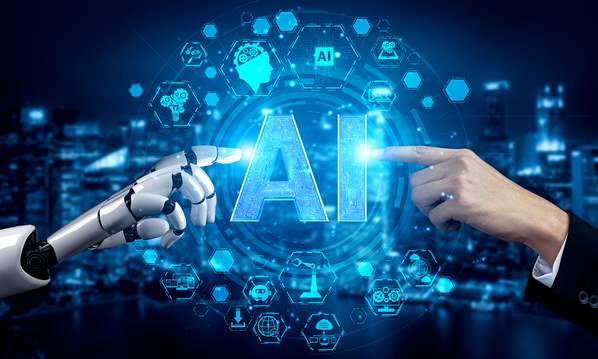The narrow line separating our physical and virtual lives fades in this era of rapid digitization. The metaverse, a “state-of-the-art” technology that promises to combine these two realities under one roof, is introduced in this most recent technologically advanced era.
But What Exactly is Metaverse ?
How might artificial intelligence assist with metaverse development services?
This article will explain the integration of the Metaverse with AI and examine how AI and Machine learning can help the Metaverse live up to its promises.
THE “METAVERSE” – WHAT IS IT EXACTLY?
An Overview:
The term “Metaverse” is used to refer to the virtual reality created to enhance our perception of the real world. It’s comparable to going grocery shopping in virtual reality. The metaverse is a set of virtual reality simulations that communicate with the physical world we live in. Some helpful standards are provided by Matthew Ball’s semi-manifesto.
People who are acquainted with ML/AI will be able to immediately notice how they are incorporated into the digital environment that is overlaid. For instance: There are several things that must be done before you can actually go grocery shopping, and someone needs to demonstrate the model of which aisle to shop in as well as how to obtain cucumbers and whether the refrigerator’s doors have handles. Machine learning relies on humans to comprehend what is happening in the cosmos, even in the unlikely case that the human body fails. The invention of the metaverse is not exempt from the folly of the information age. They need humans to first learn from them in order to make humans rely on machines.
The Next Big Thing?
The Metaverse is predicted to be the next significant development in the development of the Internet, with virtually limitless potential to change how we live, conduct business, learn, and even receive government benefits. But significant progress in a wide range of underlying technologies is still needed to turn the metaverse into a useful if virtual, reality.
These crucial developments may already be under progress in some circumstances. For instance, in January 2022, Meta unveiled an AI supercomputer, stating it could be used for a variety of tasks, including superfast gaming and the simultaneous translation of massive amounts of text, photos, and video. The computer will also play a crucial role in creating the next generation of AI models and serve as the basis for the development of metaverse technologies in the future.
However, despite being on the market today, consumer products like smart glasses or virtual reality (VR) headsets still fall short of capturing or transmitting the whole metaverse experience. To give users of the metaverse a genuinely seamless experience, new devices will be created. The haptic glove, another Meta innovation, enables users to interact with and feel virtual items in the Metaverse.

Piecing The Puzzles
According to experts, the Metaverse will be built on seven key technologies: Artificial intelligence, cloud computing, digital twins, extended reality, Brain-computer interfaces, and 5G communication. Given its ability to allow the metaverse to scale, AI/ML may be the most important component of this emergent technology landscape.
Most interactions in this new extended reality world will probably be powered by deep learning-based software, with chatbots and other Natural Language Processing (NLP) technologies facilitating many kinds of exchanges. AI will also make it possible for the metaverse’s machines to accurately respond to user inputs regardless of the language used by the user, including text, graphics, and even video. However, this will need a tonne of data, and it could take years to train such sophisticated NLP models. AI is a crucial technology for the creation of the metaverse, and it is used in VR and augmented reality as well as computer vision and Natural Language Processing. For instance, AI is utilized in AR technology to support the diversity and usefulness of AR applications by being employed in camera calibration, detection, tracking, camera posture estimation, immersion rendering, real-world object detection, virtual object recognition, and 3D object reconstruction.

How Can Artificial Intelligence (AI) Help the Metaverse?
Data preservation and management will be made easier by AI in the metaverse, which will also ensure an immersive experience. These environments will generate a huge quantity of fresh information and data, from user-generated material to vendor creative, which might easily become unmanageable.
AI will always be available to support us as we become increasingly reliant on online life and develop new digital technologies. Like any other digital innovation, AI enables individuals to utilize the metaverse more effectively. AI contributes to the creation of a successful metaverse by controlling traffic and resource usage and making sure everything runs well. Additionally, it recognizes security risks and guards the metaverse against them.
AI facilitates communication in the Metaverse by translating messages and assisting you in finding individuals and locations based on your interests. Making the metaverse immersive with AI also enables you to construct realistic avatars and settings. In this sense, AI supports the metaverse’s platform, infrastructure, and experience layers.
AI technology is anticipated to support the Metaverse’s expansion by assisting object detection, enhancing rendering, and enabling the measurement and control of cybersickness. The metaverse still faces numerous obstacles to be addressed, including security risks and internet abuse, despite its promise and potential. However, one of the technological instruments that might be crucial in overcoming such obstacles is probably AI.

How Does Artificial Intelligence (AI) Contribute To The Metaverse?
Speaking of AI, it is a field of study that focuses on creating intelligent computers capable of carrying out tasks that typically need human intelligence. To be more precise, the AI-Metaverse combination ensures the stability of the metaverse’s infrastructure. In addition, it sends useful information to the topmost layers.
AIOps
To automate IT operations procedures, AIOps blends big data and machine learning. It assists in the management of all necessary elements, including communications, software, and hardware, making it a crucial component of the metaverse. For the metaverse infrastructure to be reliable and to give insights that are important to the upper layers, managing these components is very important. Users can use the metaverse without difficulty thanks to AIOps’ speedy and effective problem-solving capabilities.
Inclusive User Interface
The main goal of the Metaverse is to give all users an immersive experience. This new digital world does have some restrictions, though. People without disabilities find it difficult to function in the metaverse, although normal people can enhance their social experiences and gain various advantages. Here comes AI to save the day. Intelligent exoskeletons to engage with the digital environment, automatic translation, image recognition for persons with visual impairments, and brain-computer connections to ensure that every user experiences the metaverse are all made possible with AI.
Exceptional Creative Partner
For creative applications, AI is the greatest choice. GPT-3, the most recent NLP model, recently decided to cooperate with AI (to generate creative-based writing on user inputs). However, being a creative collaborator implies more than just producing material; it also includes being beneficial in a variety of other ways, such as producing lifelike visuals from written or drawn language. There is no question that AI may be a potent creative collaborator, and Promethean Al, a speech-activated collaborator for 3D, is one of the best examples.
Metaverse Development
AI is a crucial technology for the advancement of computer vision, VR, and AR in the Metaverse, along with NLP. AI is used in AR technology to calibrate cameras, detect objects, track them, produce immersive scenes, and more, all of which improve the usefulness of AR apps. In the metaverse, AI produces the majority of the 3D graphics, animations, and voice. Automation of distributed ledgers, smart contracts, and other blockchain technologies can be done for virtual transactions using machine learning models.
Better Accessibility
The Metaverse is now undergoing efforts to increase user accessibility while also making it a safe and secure environment. Moreover, AI might make this achievable. AI aids in the development of metaverse social networking. AI can be employed, for instance, in the development of virtual assistants that can guide users through the Metaverse and help them locate their desired objects. Additionally, it keeps track of user actions and prevents hateful or abusive language.
We can therefore improve the metaverse and make it the best place by using AI to create an immersive experience for consumers.
To Sum Up
A digital platform called the Metaverse has the power and capacity to completely transform both the virtual and real worlds. By creating new goods and services, improving smart contracts, and enabling social networking to the fullest, AI can help the metaverse pick up the pace and deliver on its promises.
Metappfactory is one such well-known business that keeps up with the use of AI and Metaverse technology. Being a Metaverse development company we will never let your ideas down.
In a nutshell, AI can engage with the Metaverse in a variety of ways, including through digital avatars, chatbots, interfaces, and more. Artificial intelligence may advance even further, though, until the advent of the Metaverse, which will open up new prospects for collaboration amongst various technologies.






